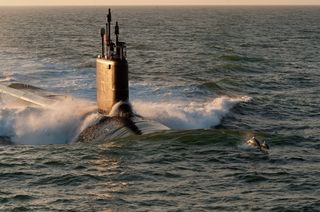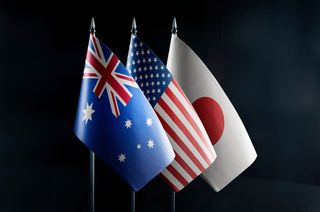The United States Studies Centre hosted its inaugural National Summit on 21st Century America: Reflections, Aspirations and Challenges, from 10 - 11 December 2007. The Summit explored emerging trends in American foreign policy, politics, business and society. The 150 participants included academics, postgraduate students, and representatives from government, consular offices, the media and business.
The Summit program was structured around the themes of Power and Democracy, Wealth Creation and Rights Protection and American Thinking.
Sunday 9 December
Cocktail Reception
Monday 10 December
Welcome and Opening Remarks
- Dr Sean Gallagher, Director of Operations and Projects, United States Studies Centre
- Professor Alan Dupont, Acting CEO, United States Studies Centre
- Professor Gavin Brown AO, Vice-Chancellor and Principal of the University of Sydney
- Mr Robert D. McCallum Jr, US Ambassador to Australia
<iframe src="https://player.vimeo.com/video/26361377" width="640" height="512" frameborder="0" webkitallowfullscreen mozallowfullscreen allowfullscreen></iframe>
National Opinion Survey: Results of the survey Australian Attitudes Towards the United States, Part 2
- Professor Murray Goot, Visiting Professor, United States Studies Centre
<iframe src="https://player.vimeo.com/video/26362057" width="640" height="512" frameborder="0" webkitallowfullscreen mozallowfullscreen allowfullscreen></iframe>
Keynote Address: Will the Next US Foreign Policy Look Surprisingly Like the Current One?
President Bush has been under withering criticism for more than two years because of his policy in Iraq and his emphasis on unilateral approaches, reaching a recent low public approval rating of 30 percent. Will his successor initially be radically different as most observers assume? An examination of current and plausible circumstances in Iraq, Iran, the war on terror, North Korea, Pakistan, China, Russia, India, NATO, the Palestinian-Israeli conflict, and the United Nations suggests there may be fewer fundamental variations than most critics of the President expect.
- Professor Michael Nacht, Dean and Professor of Public Policy, Goldman School of Public Policy, University of California - Berkeley
Australian respondent: Professor Robert O'Neill AO, Former Director and Chairman of the International Institute for Strategic Studies, London
<iframe src="https://player.vimeo.com/video/26362732" width="640" height="512" frameborder="0" webkitallowfullscreen mozallowfullscreen allowfullscreen></iframe>
<iframe src="https://player.vimeo.com/video/26363219" width="640" height="512" frameborder="0" webkitallowfullscreen mozallowfullscreen allowfullscreen></iframe>
<iframe src="https://player.vimeo.com/video/26363644" width="640" height="512" frameborder="0" webkitallowfullscreen mozallowfullscreen allowfullscreen></iframe>
Wealth Creation and Rights Protection
This lecture is on 'How Countries Compete' - a summary/sample of a book I recently published. The theme is that countries, like companies, compete for exports and growth in the global economy. Like firms, they have strategies and structures that work together, either effectively or ineffectively. The role of government is crucial. While the book deals with seven developmental trajectories and 10 countries, my presentation will focus on just a few - examples of high-growth Asia, countries from Latin America and Africa that are "stuck in the middle," and developed countries - Japan and the USA - facing crises.
- Professor Richard Vietor, Senator John Heinz Professor of Environmental Management, Harvard Graduate School of Business Administration
Australian respondent: Mr Tim Harcourt, Chief Economist, Australian Trade Commission (Austrade)
<iframe src="https://player.vimeo.com/video/26364652" width="640" height="512" frameborder="0" webkitallowfullscreen mozallowfullscreen allowfullscreen></iframe>
<iframe src="https://player.vimeo.com/video/26404681" width="640" height="512" frameborder="0" webkitallowfullscreen mozallowfullscreen allowfullscreen></iframe>
<iframe src="https://player.vimeo.com/video/26405333" width="640" height="512" frameborder="0" webkitallowfullscreen mozallowfullscreen allowfullscreen></iframe>
Summit Dinner
Welcoming remarks by Mr James Wolfensohn, former President of the World Bank
Dinner speech by Australian writer Don Watson, whose latest book, American Journeys, is a narrative of modern America from his recent travels in the United States
Tuesday 11 December
Power and Democracy
The central foreign policy debate among 2008 presidential candidates pits the largely Democratic view that the 21st century poses many different threats and challenges against the largely Republican view that the central overriding threat to American security is Islamic terrorism, or, more provocatively, Islamofascism. These two views rest on different assumptions and give rise to different strategies. The "one enemy" worldview has great attractions in a democracy, where voters who do not think very much about foreign policy are naturally put off by the complexity of the actual 21st century world. The way out of this dilemma is to stop being so obsessed with threats and instead offer a positive vision of the world, one that requires long-term engagement, collaboration, and institution-building, to achieve.
- Professor Anne-Marie Slaughter, Dean of the Woodrow Wilson School of Public and International Affairs, Princeton University
Australian respondent: Mr Allan Gyngell, Executive Director, Lowy Institute for International Policy
<iframe src="https://player.vimeo.com/video/26406324" width="640" height="512" frameborder="0" webkitallowfullscreen mozallowfullscreen allowfullscreen></iframe>
<iframe src="https://player.vimeo.com/video/26408989" width="640" height="512" frameborder="0" webkitallowfullscreen mozallowfullscreen allowfullscreen></iframe>
<iframe src="https://player.vimeo.com/video/26407269" width="640" height="512" frameborder="0" webkitallowfullscreen mozallowfullscreen allowfullscreen></iframe>
<iframe src="https://player.vimeo.com/video/26409802" width="640" height="512" frameborder="0" webkitallowfullscreen mozallowfullscreen allowfullscreen></iframe>
American Thinking
From the beginning of European settlement, Americans have struggled with three fundamental issues: is the good of the whole more important than the liberty of the individual; is it possible for a democracy to co-exist with racism; and is America so exceptional that it can, and should, act unilaterally to pursue its wishes in the world? These questions, then and now, shape ongoing tensions over who Americans are, and what we believe.
- Professor William Chafe, Alice Mary Baldwin Professor of History, Duke University
Australian respondent: Dr Stephen Robertson, Senior Lecturer in History, University of Sydney
<iframe src="https://player.vimeo.com/video/26410629" width="640" height="512" frameborder="0" webkitallowfullscreen mozallowfullscreen allowfullscreen></iframe>
<iframe src="https://player.vimeo.com/video/26411915" width="640" height="512" frameborder="0" webkitallowfullscreen mozallowfullscreen allowfullscreen></iframe>
Public Forum
The 2007 National Summit concluded with a public forum hosted by Peter Thompson of ABC TV's Talking Heads. The event was an engaging discussing on the US with the Summit's keynote speakers: Anne-Marie Slaughter, Richard Vietor, William Chafe and Michael Nacht. They were joined by Australian journalist Michael Gawenda.



